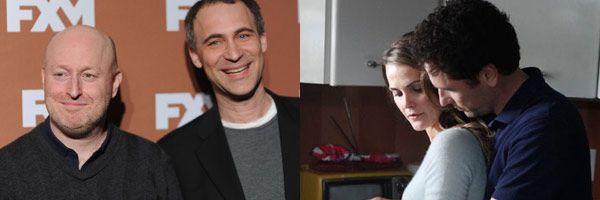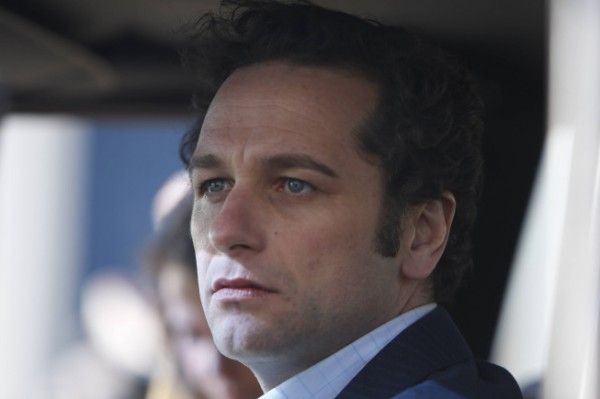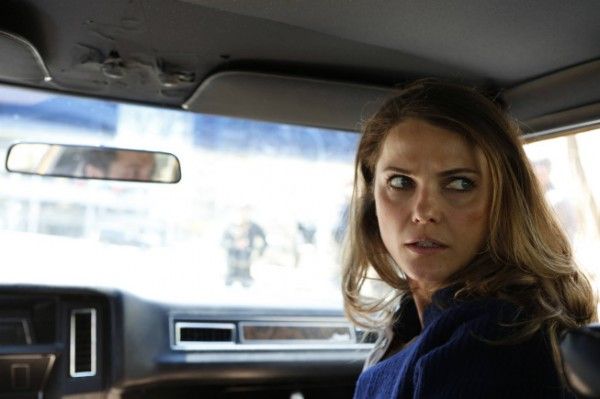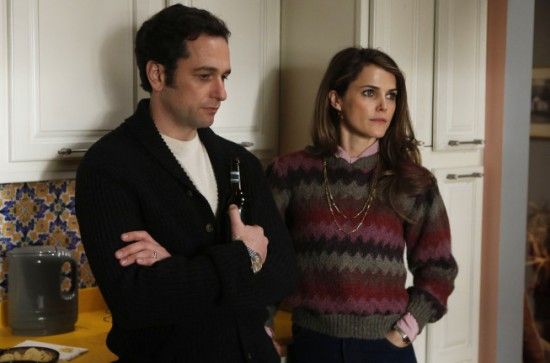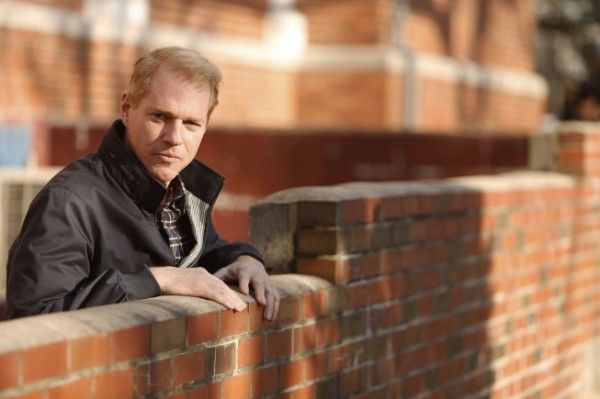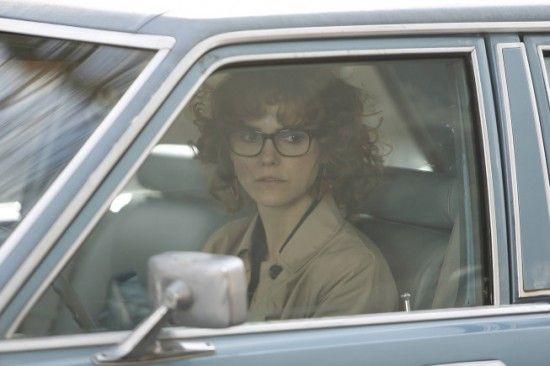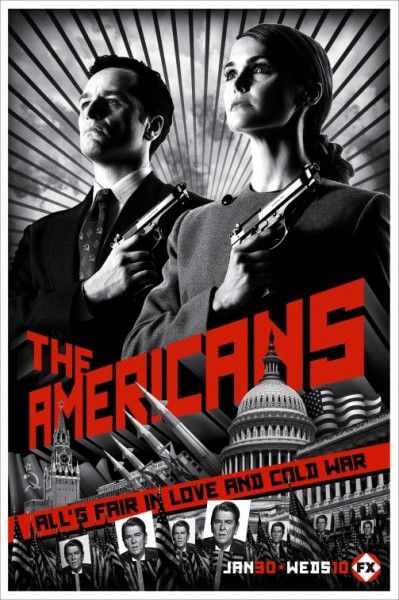The Americans is FX’s period drama about the complex and complicated marriage of two KGB spies posing as Americans in suburban Washington, D.C., shortly after Ronald Reagan was elected President. Philip (Matthew Rhys) and Elizabeth (Keri Russell) have a network of spies and informants under their control, while their two children – 13-year-old Paige (Holly Taylor) and 10-year-old Henry (Keidrich Sellati) – know nothing about their parents’ true identity. Even though Philip’s growing affinity for America’s values and way of life leads to tension with Elizabeth, the two must work together to keep the FBI from discovering who they really are.
During this recent interview to look back on Season 1 and ahead to Season 2, executive producers Joseph Weisberg and Joel Fields talked about the origin of the series, finding the perfect lead actors, determining how much of a cliffhanger they wanted to end on, where they’re hoping to take Season 2, their possible plans for the kids and their inevitable suspicions, and that they’ll have to get to work pretty quickly on the second season. Check out what they had to say after the jump, and be aware that there are some spoilers.
Question: Where did the idea for this show initially come from?
JOSEPH WEISBERG: In 2010, there were a bunch of Russian intelligence service spies who were arrested in the United States, and a lot of people were very surprised that, after the collapse of the Soviet Union, Russia was still sending this type of deep cover spy to spy on the United States. They were posing as everyday Americans. They were, in other words, illegal, like Philip and Elizabeth. After the FBI arrested them and carted them off to jail, I got a call from the heads of DreamWorks Television – Darryl Frank and Justin Falvey – who asked me if I’d be interested in developing a television show based on what had happened. I said, “Yes, that would be great! I would love to do that!” And then, I wandered the streets for a little while until I thought of putting it back in the Cold War, which would make it a little more exciting. That was the genesis of the show.
Did you always know that you wanted Keri Russell and Matthew Rhys for the lead roles?
WEISBERG: No, I had no idea. In fact, I’d only been working in television at all for about two years, at that point. When we were developing the show, and even after I’d written a version of the script, people would ask that very common Hollywood question of, “Who do you see as the lead?” And I know you’re supposed to have an answer to that, but I never did. I would always bumble and mumble and say that I didn’t know because I didn’t have anybody in my head. I didn’t have much of an idea, at all. Then, when it was time to actually shoot the pilot and we started thinking about people and looking at lists of people, two things happened. One is that John Landgraf, the president of FX, had a light bulb go off and went, “Keri Russell.” That was pretty much where the idea of Keri Russell came from. With Matthew Rhys, Leslie Feldman, who’s the head of casting at DreamWorks, saw him in a play. That was the original inspiration for casting Matthew.
How did you determine just how much of a cliffhanger you wanted to have for the finale?
JOEL FIELDS: We actually talk a lot about that, in the writing of the stories and the writing of the scripts. Something Joe and I, just in our first early meetings, talked about, in regard to what we want the show to feel like and where we wanted it weighted, was that we really wanted to do something that was set in the spy world, but was a character study, and was about the people and relationships and themes that interested us. What we specifically did not want to try to do was a super-charged ultra cliffhanger escalation where, with each episode, we had to out-crisis ourselves. Maybe our desire not to do that was just the knowledge that we couldn’t, or couldn’t do it as well as they did on 24. We purposely wanted to do something that was different, to the extent that, if there were cliffhangers, they were more of the emotional and character kind. What’s going to happen with this relationship? What are the universal marriage experiences and family experiences that we all face, and how can they get expressed through this crazy, intensified life-and-death world that Philip and Elizabeth, and Stan, and everyone else, are in.
This season was as much about the story of a marriage as much as it was about spycraft. What do you see as the main challenge for Season 2?
FIELDS: It’s interesting. You work on these shows so intensely and you’re following where the characters lead and looking for what it is you want to say. We spend a lot of time talking about next season and what we want to explore. We know that this is a show about a marriage, and about marriage, in general, relationships and identity. We know that we don’t want to tell the same story, next season, that we told this season. What we want to explore is the next phase and iteration of that. We have a lot of ideas and thoughts. We don’t know where it’ll end. If you asked us, when we were shooting Episode 3, where we were going to go with the rest of the season, we would have given you some very clear and firm answers. What we would have told you about Nina turned out to be exactly where we went. What we would have told you about Philip and Elizabeth grew and changed as the stories unfolded for us and they led us in other directions. What we look forward to is another exciting, surprising and, we hope, rich season.
WEISBERG: At the end of the season, Philip and Elizabeth are on the same page, but I think most people who are married would agree that, in marriage, you’re on the same page and then you’re off the same page. It’s on and off.
Did the direction of the season change, at all, once you knew you’d been picked up for Season 2?
FIELDS: No, not really. It changed, in the sense that it had its own process. There clearly was a weight that lifted from us, when we knew that the second season was ordered. There was a great sense of confidence and support from FX, and we felt even more challenged to make it great. We certainly didn’t have that looming question that some writer/producers have, as they go into the end of their season, which is, “God, am I writing the final episode of the show and closing the book, or am I just closing a chapter and launching into next season?” All of those weights were lifted from us. There was nothing that changed, in terms of storyline, that wouldn’t have otherwise changed. It was all part of a process. What the early renewal did was, for us, was instill a sense of confidence and support, as we explored.
What are your plans for the kids, particularly Paige, who seems to be suspicious, at this point?
WEISBERG: We think a lot about these kids, and what it is to be young kids who have been raised by these parents who are telling such an enormous fundamental lie about who they are and how that’s going to affect the kids, over time. I like the idea that, even though they don’t know anything, there’s some level on which, of course, they know everything. It’s a question of how and when it might bubble to the surface. I don’t think we know yet when and how that will be revealed in the storytelling, but the idea of it coming up to the surface in dribs and drabs, and in different horrifying pieces, is very appealing, as a storyteller. I like to talk about the thing that I found most compelling and fascinating when I worked at the CIA, which is that the families that served abroad together, the parents obviously couldn’t tell their kids, whether it was the mother or father or both, that they worked at the CIA. If you told a young kid that, the young kid would go tell their friends and that would be the end of the assignment. As the kids got older, there would be a point, eventually, where the parents would sit down and have what was known as “the talk.” Maybe the kid would be 13, 14 or 15, or whenever the kid was mature enough to keep a secret.
It just always seemed so sad and powerful and strange that a kid could sit down at 15 and have their parents say, “Listen, we’ve been telling you this huge, huge lie your entire life,” and what that can do to a family. I think different families responded to it very differently. The idea of a family where the parents are spies and how that affected them, and the idea of being able to tell a television story where that was central to the whole dynamic, is one of the appealing things about The Americans. I don’t think that necessarily means that Philip and Elizabeth will sit down and have “the talk” one day, but I think that it does mean that the question of the parents telling the kids such a big, fat lie that affects their whole identity is central to the show.
FIELDS: One of the things that Joe and I talk about, from time to time, is imagining either of these kids in therapy in 20 years, suddenly finding out what really happened with their parents and going, “That explains so, so, so much.” Part of the creative appeal and power of what Joe’s created in the show is that there are these personal relationships that are so strong, so interesting and so real, but they also have these great allegorical properties. Paige is this daughter in a fake marriage from this family of spies, but really, all that’s going on in that finale scene in the laundry room is that she’s doing what every adolescent does, which is starting to question whether or not her parents are who they really said they were. That’s something every adolescent goes through and we all can relate to. It’s just that in her case, boy is she right.
If Margo Martindale’s pilot gets picked up, can she still remain on this show?
FIELDS: We love Claudia, and we love Margo Martindale. But, the KGB has a very, very long reach and we believe that, when given the opportunity, they will return Claudia to her rightful position, doing what it is she should be doing.
WEISBERG: If they know what’s best for them.
Will the relationship between Sandra and Elizabeth, as well as between Philip and Stan, develop further next season?
WEISBERG: It was great seeing Elizabeth and Sandra. Obviously, the relationship hasn’t gone that far, but just in the scenes they have together and the little embryonic stages of whatever it’s going to be, there’s something great about those two together, so I’m sure we’ll want to explore that further.
Will Nina’s relationship with Stan continue to be explored, or will it all have been an illusion, next season?
WEISBERG: As for Nina and Stan, that’s been such a powerful and intense part of the season, both with the spycraft and the emotional journey. Seeing where that goes next season is going to be one of the cornerstones of the season, next year.
How much downtime do you have, before you have to gear up for next season?
FIELDS: It’s gotten shorter. We were under an enormous crunch, this season, with a late pick-up, an early air date, a move to New York and then Sandy, which affected our set and wiped out our production office. We’ve been digging out of it, as we’ve gone. We’re going to start earlier next season, so there’s a shorter break. There’s not enough of a break, but we will get some break. The hope is that we will be able to unplug and let our unconsciousness do some work, as we prepare for next season.
WEISBERG: I daydream of just lying on the couch, resting and thinking about nothing, but my wife has rightly pointed out that I can’t really keep my brain from thinking about the show. With so much to do to plan for the second season, I’m concerned about all the thoughts rushing in, and then finding a way to jot down all those thoughts without my wife going, “You’re working. You should be resting.”
Are both of you old enough to have been adults during this time period, or do you have to have an early ‘80s expert to help you out?
WEISBERG: We’re the ‘80s experts. We were both teenagers in ’81, and seem to remember it quite well.
FIELDS: We talk about it, all the time. One of the things that’s so much fun about the show is being able to see that wardrobe, those locations, the production design, the cars and the music. We see the wardrobe photos come in and say, “My mom bought me that shirt,” or, “My dad had that sweater.” It’s really something. Joe and I are virtually the same age. I know I remember, as an elementary school student, being marched out of the class, one day, and being told to stand up, march single file outside of the class, and turn. We all faced the red brick walls of the Irwin School in East Brunswick, New Jersey, and were told to cup our hands over our eyes so that, if there was flying glass from the nuclear blast, the glass wouldn’t get in our eyes. I remember thinking, as an elementary school student, “Boy, if there’s a flash and glass from a nuclear explosion, glass in my eyes is going to be the least of my concerns. I think that’s something that’s so unique about the setting of this show. It’s set at a time when there was a real sense, in the air, that the entire world could end, in a moment. It was in the national consciousness, and both of us grew up with it.
The Americans will return for Season 2 on FX.

